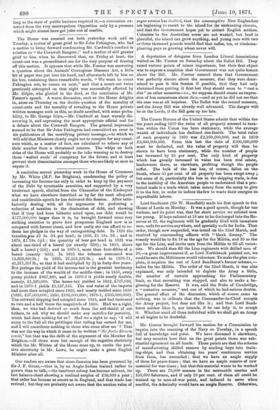A resolution moved yesterday week in the House of Commons
by Mr. White (M.P. for Brighton), condemning the policy of increasing the Income-tax only in order to keep up the payment of the Debt by terminable annuities, and supported by a very irrelevant speech, elicited from the Chancellor of the Exchequer what we have elsewhere described as by far the most adequate and considerable speech he has delivered this Session. After satis- factorily dealing with all the arguments for preferring a reduction of taxation to the diminution of debt, and showing that if they had been hitherto acted upon, our debt would be 1177,000,000 larger than it is, he brought forward some very striking statistics to prove how prosperous England now is as compared with former times, and how easily she can afford to re- deem her pledges in the way of extinguishing debt. In 1825 the taxationgas 12 9s. 3d. per head ; in 1850, 11 19s. 3d. ; and in
1870, 11 18s. ; the quantity of beer per head in 1825 was about one-third of a barrel (or exactly -358) ; in 1850, above half a barrel (-556); and in 1870-1, more than four-fifths of a barrel (exactly .823). In 1825 the tobacco consumed was 16,832,826 lb. ; in 1850, 27,553,236 lb. ; and in 1870-71, 41,371,507 lb., so that it had multiplied by 2i- in forty-five years. But perhaps the yield of the income-tax is the greatest testimony to the increase of the wealth of the middle-class ; in 1850, every penny yielded 1867,880, and in 1870-1 it yields nearly double, namely, 11,520,000. The house-tax yielded in 18.52, /727,026, and in 1870-1 yields 21,127,125. The real value of the imports had more than octupled since 1825, and nearly trebled since 1850 (1825, £37,000,000; 1850, £105,000,000; 1870-1, 1303,000,000). The outward shipping had octupled since 1825, and had increased to two and a half times the magnitude of 1850. Had we a right, then., we who had derived so much from the self-denial of our fathers, to ask why we should make any sacrifice for posterity, which had done nothing for us? Had we a right to say, I will enjoy to the full all the privileges that toiling has earned for me, and I will contribute nothing to those who come after me ' ? That was not the way in which it came to be written "Sic fortis Etruria crevit," but that was the drift of the argument of the Member for Brighton.—If there were but enough of the negative electricity which the Mr. Whites of the House store up, to excite the posi- tive electricity in Mr. Lowe, he might make a great English Minister after all.


































 Previous page
Previous page